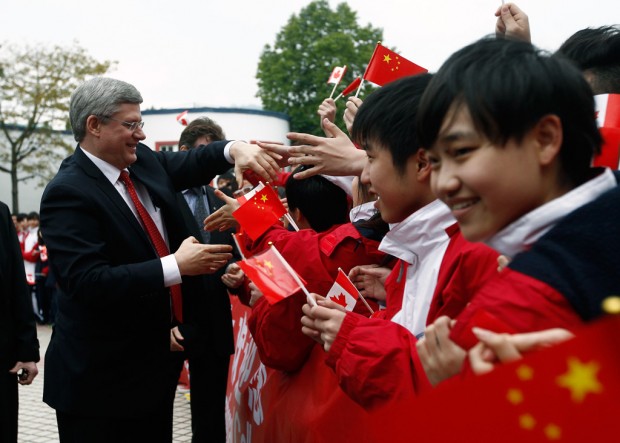“The ultimate question here is, are we selling all of our resources to foreign investors, and are they being put to the best use for the best value”
– Reynold Tetzlaff, Canadian energy leader for PricewaterhouseCoopers LLP.
Following several trade missions to China and emphatic discussion of increasing investment opportunities, it appears that Canada and the Asian superpower have finally struck a deal. On Monday July 23, 2012, Chinese state-owned oil and natural gas company, CNOOC Ltd placed a $15.1 billion offer for Calgary-based, Nexen Inc. The acquisition of Canada’s sixth-largest explorer and producer of natural resources marks to-date the biggest foreign procurement for the Chinese company. It also signals what could be a string of investments by energy-ambitious China that is bound to test Prime Minister Stephen Harper’s much acclaimed economic strategy.
[captionpix align=”left” theme=”elegant” width=”320″ imgsrc=” http://financialpostbusiness.files.wordpress.com/2012/07/cnooc-jason-lee-reuters.jpg?w=620 ” captiontext=” CNOOC could solidify plans in Alberta with the takeover of Calgary-based oil giant, Nexen.”]
In February 2012, Harper travelled to Beijing where Canadian officials and their Chinese counterparts began “exploratory discussions on deepening trade and economic relations.” The exploitation of Canada’s natural resources has been at the forefront of Harper’s government and has guided his rhetorical engagement with China thus far. The Government of Canada’s Invest Canada-Community Initiative programs is a pertinent example of Harper’s home-based venture to charm foreign investors. “By supporting local communities in their efforts to attract international capital, our government is helping to create jobs and prosperity” Minister of Public Works, Rona Ambrose stated.
The Prime Minister’s calls have now resonated with eager Chinese companies. Until recently, Sino-Canada economic engagement has manifest in Chinese equity stakes and partnership in various Canadian companies. Having amicable relations with China, Canada’s interest in expanding its eastern horizons, could offer the country vast benefits, notably a diversified trade relations and economic growth. On the other hand, last week’s proposal has raised eyebrows and deservedly so, given that China’s strategic maneuvers could give them provision over the treasured extractive sector of Canada’s economy.
China on the prowl
The bid for Nexen Inc, however, is far from a nascent Chinese interest. Sources close to the deal claim that Nexen has been on CNOOC’s radar for the pasted five years and the firing of Nexen’s CEO, Marvin Romanow, in January, opened up a ripe opportunity for Chinese oil giant to make their move. CNOOC, who maintains Nexen has been a partner of the company for years, also has investments in shale gas in British Columbia and has been active in oil sands operations in Alberta. In July 2011, for example, CNOOC purchased Opti Canada Inc, Nexen’s 35 percent partner in Long Lake and Kinosis area, arguably a tactic to help it evaluate Nexen’s operations.
Beyond CNOOC, China Investment Corporation has become increasingly active in Canada in recent years. As one of the largest sovereign wealth funds in the world, it has purchased one-fifth of the shares of Teck Resources; a Canadian company with 13 mines internationally. In addition, PetroChina purchased the entire Mackay River oil sands project from Athabasca Oil Sands Corporation for $680 million.
[captionpix align=”left” theme=”elegant” width=”320″ imgsrc=” http://www.cbc.ca/photos/galleries/1849/1849_30339_web_8column.jpg” captiontext=” Stephen Harper talks with CCP party secretary Wang Yang in a meeting in Guangzhou while on trade mission.”]
Political Friction
What sets CNOOC’s acquisition of Nexen apart from these other purchases, is that this transaction constitutes a takeover. While this proposal will have to pass scrutiny under the Canada Investment Act, there are numerous questions and concerns raised from various angles surrounding this deal.
For Canada, an obvious anxiety is the loss of sovereignty over the county’s most valuable resource. Theodore Moran of the Peterson Institute for International Economics argues Canada’s main concern over China’s investment in its economy should focus on the potential abuse of privacy and subsequently possibilities of spying on the part of the Chinese government. Other concerns, Moran states, will coalesce around Canada’s loss of capacity to manipulate oil supply and that China will gain access to technological information.
But the political consequences this deal could yield go beyond concerns for national security. Canada’s relationship with the United States will also be impacted. As the key holder of the United States’ debt, Chinese potential control over Canada’s oil supply is undoubtedly problematic. Senator John Hoeven has stated that the CNOOC-Nexen deal is a “direct result” of President Barack Obama’s decision to delay the approval of the Keystone XL pipeline, which would make accessible Canada’s oil sands to refineries in Texas. “If we don’t get on it, China’s already moving. He who hesitates has lost” the Senator proclaimed.
The U.S. “lost” in 2005, when CNOOC attempted to purchase California-based Unocal for $18.5 billion. However, the deal was subsequently abandoned when criticism mounted in the United States over the possibility that energy supplies would be diverted to meet Chinese needs.
Chinese state-run companies like CNOOC have learned from the failings from such unsuccessful negotiations. They have also gained proficiency in how to court the Canadian government. While Harper appears to have shifted his rhetoric, he reneged on the $39 billion procurement of Saskatchewan-based Potash Corporation by Australian mining giant BHP Billiton in 2010. Despite the generous offer that gives a 61 percent premium to Nexen’s stock price, the takeover will likely pass similar hurdles in Ottawa. Concerns over productivity, job creation, and how much control the Chinese government will have over the trajectory of the company will arise. Despite these considerations, the proposal will likely be approved. As Oliver Borgers, a lawyer for McCarthy Tetrault, has stated it would be “really hard for [Mr. Harper] to say no when he’s just gone on all these trade missions to China to promote investment in this country… This is a really good time to get a deal that otherwise faces certain challenges.”
If the transaction cannot secure a net benefit for Canada, however, it may in fact be easy for Harper to turn down this offer. Among other things, his government will have to consider whether Canada will gain access to lucrative Chinese markets, and if so, in what capacity. What is certain is this decision is an opportunity for Harper to leave his mark on Canada’s economy. And his decision will have a heavy impact at present and for future foreign investment prospects.




